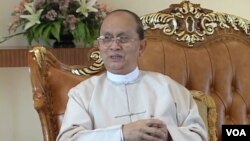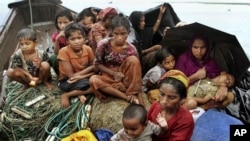Burmese President Thein Sein says his government will open schools to improve the education of minority Rohingya Muslims who accuse the majority Buddhist state of persecuting them.
In an exclusive interview with VOA Burmese Service chief Than Lwin Htun in Naypyidaw, Thein Sein called education an important tool to help different communities live in harmony and respect human rights.
He said Bengalis - his term for the Rohingya - have only religious schools and lack what he called "proper education."
"So we will open schools for them and give them modern education," he said. "And once they become educated, they will be more thoughtful and can decide what is right and what is wrong."
July 12, 2012: U.S. President Barack Obama eases economic sanctions while banning U.S. business contacts with Burmese military and keeping arms embargo in place.
April, 2012: European Union suspends trade and economic sanctions for one year after lifting some visa restrictions in February. The EU arms embargo remains in place.
June, 2012: Australia lifts remaining travel and financial sanctions, but keeps arms embargo in place.
April, 2012: Canada eases economic sanctions but maintains arms embargo and assets freeze on specific individuals.
In an exclusive interview with VOA Burmese Service chief Than Lwin Htun in Naypyidaw, Thein Sein called education an important tool to help different communities live in harmony and respect human rights.
He said Bengalis - his term for the Rohingya - have only religious schools and lack what he called "proper education."
"So we will open schools for them and give them modern education," he said. "And once they become educated, they will be more thoughtful and can decide what is right and what is wrong."
Easing of Burma Sanctions
Easing of Burma SanctionsJuly 12, 2012: U.S. President Barack Obama eases economic sanctions while banning U.S. business contacts with Burmese military and keeping arms embargo in place.
April, 2012: European Union suspends trade and economic sanctions for one year after lifting some visa restrictions in February. The EU arms embargo remains in place.
June, 2012: Australia lifts remaining travel and financial sanctions, but keeps arms embargo in place.
April, 2012: Canada eases economic sanctions but maintains arms embargo and assets freeze on specific individuals.
The Burmese government refuses to recognize the country's estimated 800,000 Rohingya Muslims as an ethnic group and denies them citizenship. Many Burmese consider the Rohingya to be illegal immigrants from Bangladesh.
Mabrur Ahmed, the cofounder and director of Restless Beings, a British-based rights group following the Rohingya situation, welcomed the Burmese president’s school pledge but warned of segregation.
“I don’t think it’s productive for a community where there’s going to be two ethnicities living side by side and they have separate schools for each set of children. But at the same time, at the moment, the Rohingya children are not receiving any education, or very limited education up to age seven, so to have access to more education is obviously a good thing,” he said.
Ahmed said without citizenship, the Rohingya and other unrecognized ethnic minority groups are not able to own land, get married or have children without state permission.
“Generally, the whole law needs to be overlooked [reviewed] where everyone has equal rights and there isn’t this separation of ‘pure breed’ Burmese and ethnic minority Burmese and hereditary Burmese,” he said.
Ahmed said Burma’s transition from a military-led to a semi-democratic civilian-led government is a “good, positive” step, and the president’s interview is a further sign of change.
Monday's interview is the first to be granted to VOA by a Burmese head of state. Burma's previous military-led administration, in which Mr. Thein Sein served as prime minister, banned VOA and accused it of spreading lies.
He also reiterated Burma's opposition to any foreign investigation of recent deadly sectarian violence between Rohingya Muslims and Buddhists in the western state of Rakhine. The Saudi-based Organization for Islamic Cooperation has called for such an investigation of the violence, which its members view as a case of religious persecution against the Rohingya.
President Thein Sein said the government is giving assistance to the victims and has asked an "independent" Burmese Human Rights Commission to investigate the unrest, which erupted in May and killed 77 people from the Rohingya and Buddhist communities. He said there is "no need" for a foreign commission to investigate the violence as an international issue.
“I don’t think it’s productive for a community where there’s going to be two ethnicities living side by side and they have separate schools for each set of children. But at the same time, at the moment, the Rohingya children are not receiving any education, or very limited education up to age seven, so to have access to more education is obviously a good thing,” he said.
Ahmed said without citizenship, the Rohingya and other unrecognized ethnic minority groups are not able to own land, get married or have children without state permission.
“Generally, the whole law needs to be overlooked [reviewed] where everyone has equal rights and there isn’t this separation of ‘pure breed’ Burmese and ethnic minority Burmese and hereditary Burmese,” he said.
Ahmed said Burma’s transition from a military-led to a semi-democratic civilian-led government is a “good, positive” step, and the president’s interview is a further sign of change.
Monday's interview is the first to be granted to VOA by a Burmese head of state. Burma's previous military-led administration, in which Mr. Thein Sein served as prime minister, banned VOA and accused it of spreading lies.
He also reiterated Burma's opposition to any foreign investigation of recent deadly sectarian violence between Rohingya Muslims and Buddhists in the western state of Rakhine. The Saudi-based Organization for Islamic Cooperation has called for such an investigation of the violence, which its members view as a case of religious persecution against the Rohingya.
President Thein Sein said the government is giving assistance to the victims and has asked an "independent" Burmese Human Rights Commission to investigate the unrest, which erupted in May and killed 77 people from the Rohingya and Buddhist communities. He said there is "no need" for a foreign commission to investigate the violence as an international issue.
Additional reporting by Kate Woodsome





